| Lesson 4 | Variable datatypes |
| Objective | Identify the Different Datatypes within PL/SQL |
Identify the Different Datatypes within PL/SQL
Every variable has a datatype, which specifies a storage format, constraints, and a valid range of values.
PL/SQL provides a variety of datatypes: SCALAR, COMPOSITE, REFERENCE, and LOB. You define a variable for a particular datatype to be able to manipulate the data. Review the following series of diagrams to identify the different datatypes available within PL/SQL.
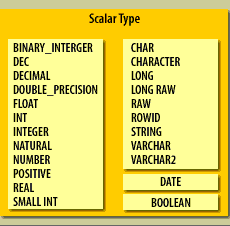
Numeric Datatypes
|
Character Datatypes
|
Date and Boolean
|
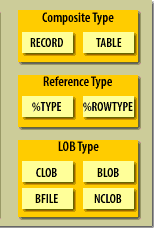
Composite Types
|
Reference Types
|
LOB (Large Object) Types
|
These datatypes are essential for advanced PL/SQL programming. 1) Scalar Type, 2) Composite, 3) Reference Type, and 4) LOB Types in PL/SQL
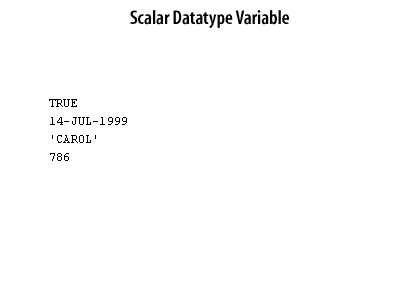
-- Declaration of an associative array (index-by table) of type CHAR
TRUE PetNameTabTyp IS TABLE OF CHAR(10)
INDEX BY BINARY_INTEGER;
PName_tab PetNameTabTyp;
-- Declaration of a record type
TYPE ProductRecTyp IS RECORD (
pname VARCHAR2(30),
sale_price NUMBER(10, 2)
);
product_rec ProductRecTyp;
-
Associative Array (Index-by Table):
PetNameTabTypis a table ofCHAR(10)values indexed byBINARY_INTEGER.PName_tabis an instance of this type.
-
Record:
-
ProductRecTypis a record type with two fields:pname: A string of up to 30 characters.sale_price: A numeric value with up to 10 digits, including 2 decimal places.
product_recis an instance of this record type.
-
- A composite datatype has internal components that can be manipulated individually. PL/SQL TABLE and RECORD fall under the category of a composite datatype.
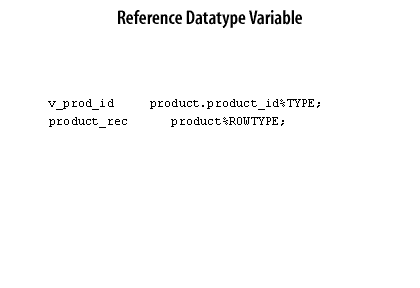
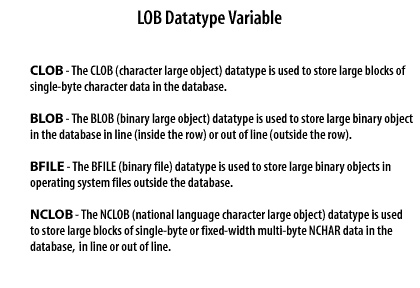
b) With LOB datatypes, you can store blocks of unstructured data such as text, graphic images, video clips, and audio files up to 4 gigabytes in size.
c) LOB datatypes allow efficient, random, piecewise access to the data and can be further divided into 4 categories as show above.
PL/SQL Datatypes have tight integration with SQL
PL/SQL datatypes have tight integration with the structured query language (SQL). PL/SQL is Oracle's procedural language extension to SQL, and it is designed to work seamlessly with SQL. PL/SQL datatypes are closely aligned with SQL datatypes, and they are used to manipulate and store data in Oracle databases. PL/SQL datatypes can be categorized into two main groups:
Here are some examples of PL/SQL datatypes and their corresponding SQL datatypes:
Note that while there is a high degree of integration between PL/SQL and SQL datatypes, there are some differences in how they are used and manipulated.
- Scalar datatypes: These are similar to SQL datatypes and include types such as NUMBER, VARCHAR2, DATE, and TIMESTAMP.
- Composite datatypes: These are more complex datatypes that can store multiple values, such as arrays and records.
Here are some examples of PL/SQL datatypes and their corresponding SQL datatypes:
| PL/SQL | SQL Datatype |
| NUMBER | NUMBER |
| VARCHAR2 | VARCHAR2 |
| DATE | DATE |
| TIMESTAMP | TIMESTAMP |
| BOOLEAN | (no equivalent) |
Note that while there is a high degree of integration between PL/SQL and SQL datatypes, there are some differences in how they are used and manipulated.
Beginning Oracle PL/SQL
How to program with PL/SQL Datatypes?
SQL has become the standard database language because it is flexible, powerful, and easy to learn. A few English-like statements such as
Running a SQL query and processing the result set is as easy in PL/SQL as opening a text file and processing each line in popular scripting languages. Using PL/SQL to access metadata about database objects and handle database error conditions, you can write utility programs for database administration that are reliable and produce readable output about the success of each operation. Many database features, such as triggers and object types, use PL/SQL. You can write the bodies of triggers and methods for object types in PL/SQL and PL/SQL supports both
PL/SQL datatypes include all the valid SQL datatypes as well as "complex datatypes" based on query structures.
- SELECT,
- INSERT,
- UPDATE, and
- DELETE
Running a SQL query and processing the result set is as easy in PL/SQL as opening a text file and processing each line in popular scripting languages. Using PL/SQL to access metadata about database objects and handle database error conditions, you can write utility programs for database administration that are reliable and produce readable output about the success of each operation. Many database features, such as triggers and object types, use PL/SQL. You can write the bodies of triggers and methods for object types in PL/SQL and PL/SQL supports both
- static and
- dynamic
PL/SQL datatypes include all the valid SQL datatypes as well as "complex datatypes" based on query structures.
Oracle Database PL/SQL Programming
Scalar Datatypes
Here is a list of scalar datatypes available in PL/SQL:
Numeric Datatypes
Character Datatypes
Date and Time Datatypes
Boolean Datatype
Miscellaneous Datatypes
Numeric Datatypes
- NUMBER (includes integer and floating-point numbers)
- BINARY_FLOAT
- BINARY_DOUBLE
- DEC (deprecated)
- DECIMAL (deprecated)
- NUMERIC (deprecated)
- INTEGER (subtype of NUMBER)
- INT (subtype of NUMBER)
- SMALLINT (subtype of NUMBER)
- FLOAT (subtype of NUMBER)
- DOUBLE PRECISION (subtype of NUMBER)
Character Datatypes
- CHAR
- VARCHAR2
- NCHAR
- NVARCHAR2
- STRING (subtype of CHAR or VARCHAR2, depending on the context)
Date and Time Datatypes
- DATE
- TIMESTAMP
- TIMESTAMP WITH TIME ZONE
- TIMESTAMP WITH LOCAL TIME ZONE
- INTERVAL YEAR TO MONTH
- INTERVAL DAY TO SECOND
Boolean Datatype
- BOOLEAN
Miscellaneous Datatypes
- RAW (raw binary data)
- LONG RAW (deprecated)
- ROWID (a unique identifier for a row in a table)
- UROWID (a universal rowid, used for foreign tables and non-Oracle tables)
Composite Types
RECORD TABLE VARRAYReference Types
REF CURSOR REF object_typeLOB Types
BFILE BLOB CLOB NCLOB
Variable PL/SQL Data Types
The correct values and their datatypes are:
There are two generalized types that you define in packages. You can declare
TRUE:SCALAR datatypeRECORD:COMPOSITE datatype%ROWTYPE:REFERENCE datatypeBLOB:LOB datatype
There are two generalized types that you define in packages. You can declare
- static or
- dynamic datatypes.
| Attribute | Description |
| %ROWTYPE | The %ROWTYPE anchors the datatype of a variable to the row structure of a database catalog object (table or view), or PL/SQL record structure. The new variable inherits both the position and datatype of the columns found in the referenced table or view when you anchor to a catalog object. The new variable inherits both the position and datatype of the explicit PL/SQL record structure, which may inherit indirectly from one or more catalog objects |
| %TYPE | The %TYPE anchors the datatype of a variable to a column datatype found in a database catalog object, like a table or view. |
Table 2-4: Anchoring Attributes
BLOB Datatype
The BLOB datatype stores unstructured binary large objects. BLOB objects can be thought of as bitstreams with no character set semantics.
BLOB objects can store binary data up to (4 gigabytes -1) * (the value of the CHUNK parameter of LOB storage). If the tablespaces in your database are of standard block size, and if you have used the default value of the CHUNK parameter of LOB storage when creating a LOB column, then this is equivalent to (4 gigabytes - 1) * (database block size). BLOB objects have full transactional support. Changes made through SQL, the DBMS_LOB package, or the Oracle Call Interface (OCI) participate fully in the transaction. BLOB value manipulations can be committed and rolled back. However, you cannot save a BLOB locator in a PL/SQL or OCI variable in one transaction and then use it in another transaction or session.
Every constant, variable, and parameter has a datatype (or type), which specifies a storage format, constraints, and valid range of values.
PL/SQL provides many predefined datatypes. For instance, you can choose from
In the next lesson, non-PL/SQL bind and host variables will be discussed.
Every constant, variable, and parameter has a datatype (or type), which specifies a storage format, constraints, and valid range of values.
PL/SQL provides many predefined datatypes. For instance, you can choose from
- integer,
- floating point,
- character,
- BOOLEAN,
- date,
- collection,
- reference, and
- large object (LOB) types.
In the next lesson, non-PL/SQL bind and host variables will be discussed.